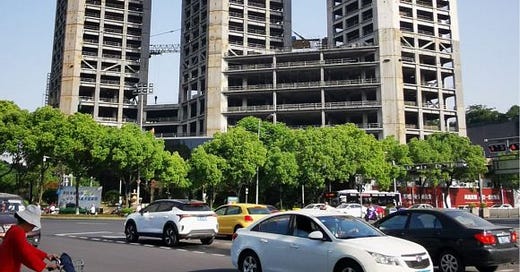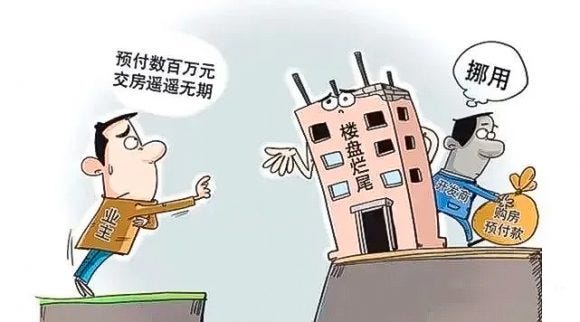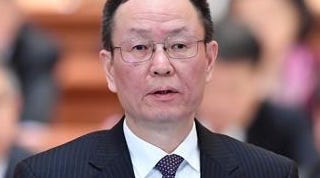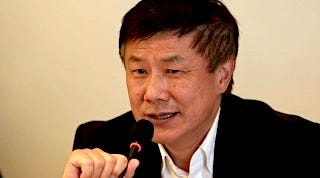An off-ramp is appearing for Xi’s crackdown on tech firms for apparent data and security breaches. Offshore IPOs may also now resume. On 21 July 2022 Didi Chuxing, the ride-hailing giant, was accused of accessing customer data 'excessively and abusively', violations of state rules that threaten national security. It was fined C¥ 8 bn (over USD 1 bn).
Macroeconomic growth in Q2 was reportedly negligible. A target of ‘some 5.5 percent’ annual growth flagged in Premier Li’s March Government Work Report is, Beijing now admits, off the table. Infrastructure stimulus via policy banks is on the cards; with GDP growth in limbo, volumes are likely to be modest. The real estate sector remains a disaster zone, albeit secondary to resurgent COVID. Buyers of unfinished housing (see lexicon below) boycotting mortgage repayments have led local governments to set up bailout funds. The Politburo in its last meeting of the month directed that housing be finished and handed over, clearly supporting mortgagees.
Exports rebounded in June with some 18 percent growth y-o-y, led by mechanical and capital goods, and autos. Total trade surplus peaked in June at some $98 bn, as import growth, suffering weak domestic demand, stagnated at around one percent.
Despite advanced country demand for PRC goods faltering, China-ASEAN trade grew over 10 percent y-o-y in H1 2022, as RCEP cut inter-regional tariffs and liberalised services trade market access. With President Joko Widodo’s Beijing visit 25-26 July, ties with Indonesia, the largest economy in Southeast Asia, are moving ahead via BRI investments. Meanwhile, rail connectivity between China, Laos and Thailand is being upgraded with the vision of constructing a pan-Asian railway network.
Shanghai issued a 5-year plan for its digital economy. NFT (non-fungible token) trading platform pilots are encouraged, with a 'digital property' trading bloc to be added to the Shanghai Data Exchange, together with improved standards and regulations for digital property and collection trading. A pioneering move from Beijing, encouraging NFTs, failed to quell market caution, or forestall closure by Tencent of its NFT business sector.
After two years of chaos, cold chain imports disrupted by tough COVID controls see signs of hope. Citing falling cases of frozen imports carrying the virus, PRC customs lifted a contentious ruling under which overseas exporters’ China trade was suspended for weeks on traces of contamination found in earlier shipments. On the verge of breakdown, logistics is to be streamlined. Yet further easing, e.g. via simplified testing and disinfections, may face more delays, as the omicron BA.5 subvariant is again testing the zero-COVID policy.
Mid-July saw the carbon market celebrate its first anniversary; jubilation was muted given sluggish trading and data tampering issues. Still at a remove from PRC priorities or panics, Hong Kong threw its hat into the global carbon trading ring.
Despite decades of work to protect them, iconic Chinese fish species, the paddlefish and wild Yangtze sturgeon, were declared extinct, reminders of the dire state of the PRC's waterways and broader environment.
On the 25th anniversary of Hong Kong’s handover to Beijing, three new texts now boost biopharma industry integration in the GBA (Greater Bay Area). Drugs, medical devices and traditional Chinese medicines approved for use in public hospitals in Hong Kong or Macao, but not in the PRC, may now be fast-tracked for manufacture and/or distribution in nine GBA cities.
Following a nationwide greenlight from State Council in April, investment in commercial pension funds now comes under temporary regulations, signaling a step forward in consolidating the pillar of the PRC’s three-tier pension system. The other two comprise the basic pension managed by the state to which all employees contribute, and enterprise annuities offered in addition by companies, to which both they and the employee contribute.
job opportunities
We welcome internship applications on a rolling basis. If you want to work at the leading edge of policy analysis on China, please join our team! See our careers page or contact hr@policycn.com for information.
lexicon
unpacking current policy-speak and keeping readers up-to-date with policy concepts that are reshaping the debate
rotten tail 烂尾 làn wěi
‘Rotten tail’ is slang for a project falling short in its final phase. A mortgage boycott movement in spring and summer 2022, potentially ruinous for the housing sector, was triggered by ‘unfinished’ residential apartments. In the cartoon, the homebuyer stretches to take possession of his unit, located in a toppling ‘rotten tail housing’ project. The developer, meanwhile, slinks out of the back of the building with a bag of ‘pre-sales funds’ which he is intent on ‘embezzling’.
featured analysis
Introducing our new 'policy shifts', delivered twice-weekly to clients.
Snapshots of new policy trends—often missed by mainstream media.
when will we be cruising down the highway?
self-driving cars hit the road in Shenzhen
how is policy shifting?
self-driving cars get legal status in Shenzhen
owner/managers liable for accidents
manufacture/seller liable if defects cause accidents
simulation platforms and vehicle-to-everything infrastructure encouraged
Fully autonomous vehicles (AVs) can run on certain roads in Shenzhen from 1 Aug 2022. Thanks to new local regulations commercial scale rollout of AVs will likely speed up in the Greater Bay Area’s buzzing innovation hub. Shenzhen is home to BYD—that recently overtook Tesla as the world’s top EV producer by sales. full post open access →
july policy movers
policy professionals in and out of the establishment
Wang Yiming 王一鸣 | People's Bank of China Monetary Policy Committee member
Urging a macro policy ramp-up to support the economy, Wang argues for a blend of fiscal measures. He highlights flaws in overly relying on infrastructure investment
lack of shovel-ready projects
misuse of funds by local governments
hidden debt
More tax cuts are needed to support firms and individuals, as well as fiscal deficits to support non-infrastructure local government spending. Monetary policy should be restrained, he argues, allowing more policy space lest problems arise, not least should the US Fed keep hiking interest rates.
Taking a PhD in 1989, Wang has since worked in government, including the NDRC. He headed the State Council’s Macroeconomic Research Centre, and was appointed to the PBoC's Monetary Policy Committee in 2021.
Zhang Yansheng 张燕生 | China International Economic Exchange Centre chief researcher
Today’s global environment resembles that of the 1920s and 30s. Order is fraying; the Russia-Ukraine war has sped up contracting cross-border investment, supply chain localisation, value-based economic alliances and prioritising of national security. Beijing’s view of the global status quo is clear when it warns of zero-sum great power rivalry as a trap. US monetary policy is this year fighting inflationary fires; the PRC should further ease monetary policy to aid economic recovery. The difference between US and Chinese economic cycles offers global investors chances to diversify and reduce financial risk, and include PRC assets into their portfolios. To become a provider of global public goods and safe assets, Beijing must move on external cooperation, above all with RCEP members, and head off US-China decoupling.
Previously the NDRC (National Development and Reform Commission) Academic Committee’s general secretary and director of its External Economic Research Institute, Zhang receives a preferential government stipend from the State Council. Teaching at the Central University of Finance and Economics 1984-96, he was an exchange scholar at the University of Toronto and World Bank 1986-88.
Dong Dengxin 董登新 | Wuhan University of Science and Technology Institute of Finance and Securities Dean
Capital markets can be influenced by personal pension funds, notes Deng. If they encourage innovation, bring more experts into the institutions and educate investor, they will propel household investment from near-term speculation to wealth management. Individual investors will, he argues, drop stock market trading and instead rely on institutionally invested funds.
Personal pension funds cannot be directly used to trade stocks. There are also strict restrictions on the type of investment products, and only three are qualified
standardised, target products for pension funds
non-standardised products developed by investment funds, insurance companies, commercial banks, asset management companies and security companies
other financial products like bank deposits, mutual funds and other asset management products
Pension pundit Dong is versed in modern finance and macroeconomics, with solid publications on banking and securities. He led research on US private pensions for the Ministry of Education in 2014. He chairs the Centre for SMEs in Hubei province.
policy ticker highlights
gems from our feed of policy releases and domestic debate
governance
Didi fined C¥8 bn for data security breaches
People's Daily (1), People's Daily (2) | 21 July
context: The investigation of ridesharing giant Didi Chuxing kicked off China’s campaign on data security scrutiny. With the publication of the Data Security Law, Personal Information Law and a series of other regulations, China’s data protection system is nearing completion. The economic slowdown is also pushing Beijing to shift to greater certainty in market regulation. This massive fine of Didi Chuxing marks the imminent end of the data security crackdown, in the eyes of many experts.
macroeconomy
localities release policy combos to resolve unfinished housing crisis
Jiemian | 22 July
context: The ongoing housing market crisis is the result of a decade-long structural problem. These policy measures are more likely to be whack-a-mole solutions that alleviate short-run pain by prolonging the long-term challenge.
trade policy
Beijing to consolidate ties with Jakarta
context: Indonesia is home to the world’s largest reserves of nickel, a key battery material for the manufacture of NEVs (new energy vehicles), which has seen significant price increases and market volatility over the past year. With the booming of both China’s domestic NEV market and exports, PRC car manufacturers have been investing heavily in Indonesia’s nickel processing industry to secure control of global NEV supply chains.
science and innovation
Shanghai encouraging enterprises to set up an NFT trading platform
Caixin | 14 July
context: NFTs (non-fungible tokens) became popular in 2021. Chinese enterprises like Alipay have also started to get involved in relevant business. On 8 Jul 2022, the Shanghai government released a plan for developing the Metaverse industry. Although the plan did not mention NFTs, it mentioned starting a ‘digital property’ trading bloc at the Shanghai Data Exchange and pledged to improve the formulation of standards and regulations on digital property and digital collection trading.
agriculture
anti-COVID regulations targeting cold-chain imports relaxed
State Council, General Administration of Customs, Weixin | 8 July
context: The disputable regulation on suspending cold-chain imports from overseas exporters with products contaminated by COVID-19 was removed. But risks of suspension or even ban of food trade still exist.
energy and environment
national carbon market sluggish, but HK hopes to become global carbon trading centre
Caixin | 11 July
context: Unperturbed by the delays and low trading on the national carbon market, Hong Kong’s stock exchange has established Hong Kong International Carbon Market Council. Experts are hopeful that Hong Kong will be able to position itself as a global centre for carbon trading, and potentially drive international capital into China to support carbon reductions.
clarification on personal pension funds
Sina Finance | 29 June
context: Pension submissions were only withheld by employers and centrally managed by the state. Opening up personal pension submissions will not only alleviate the financial burden on companies but create more funds for financial markets. But even if individuals are willing to participate, this initiative may end up as another Ponzi scheme that exhausts the life savings of households.
China Policy is a Beijing-based research and advisory company. Supporting our clients at multiple levels, from in-house research teams to execs and boards, we help them anticipate, understand and respond to China’s changing domestic policy and geopolitical environment. Contact us for more information on our publications and services.









